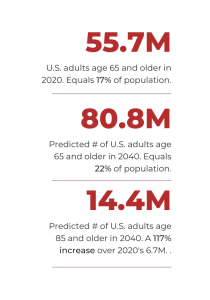As we head into Older American’s Month, a recent White House announcement could have substantial impact on aging services in the U.S., especially long-term care options for older adults. On April 18, President Biden signed an executive order to expand access to affordable care across all ages and to provide support for care workers and family caregivers.
In the announcement, the administration said hundreds of thousands of older adults and people with disabilities are left on waiting lists or struggling to afford care because more than 75 percent of all home and community-based services providers are not accepting new clients.
Biden’s executive order aims to close the gap by making long-term care more accessible and affordable, improving job quality for long-term care workers – in homes, communities, and nursing homes – and support family members who are caring for aged or disabled loved ones, including testing out a new dementia care model.
“The actions taken by the Biden Administration this week invest in the nation’s caregivers and respond to the needs of millions of older adults, people with disabilities and veterans who rely on services such as in-home assistance, nutrition, case management, transportation and other person-centered services, to live and age well at home and in their communities,” said USAging CEO Sandy Markwood about the executive order. “The bold steps taken by President Biden reflect the longstanding and growing need that USAging and our members know all too well—the nation’s 53 million caregivers need additional resources and support to deliver care to older adults, people with disabilities and veterans.”
Specifically, the executive order directs Health and Human Services to consider issuing regulations and guidance to improve care jobs, including “leveraging Medicaid funding to ensure there are enough home care workers to provide care to seniors and people with disabilities enrolled in Medicaid.”
The order also directs HHS to build on the minimum staffing standards for nursing homes and condition a portion of Medicare payments on how well a nursing home retains workers.
In its support for family caregivers, the Biden administration recognizes the physical, emotional and financial strain placed on families who cannot access care, particularly on women, who make up nearly two-thirds of family caregivers and who drop out of the workforce at higher rates than men.
“To provide greater support to family caregivers, the Executive Order directs HHS to consider testing a new dementia care model that will include support for respite care (short-term help to give a primary family caregiver a break) and make it easier for family caregivers to access Medicare beneficiary information and provide more support to family caregivers during the hospital discharge planning process,” the administration said in its release.
The order also addresses substantial increases in the cost of childcare and pays particular attention to the needs of military families and veterans.
In its fact sheet on the directives, the White House noted the rising cost of care with a 40 percent increase for older adults in the past decade and a 26 percent increase in child care costs over the same time period. Costs for child care, notably, have risen more than 200 percent over the past three decades.
Coastline CEO Justin Lees said he fully supports the goals of the executive order.
“Any initiative that can bridge the gap between older and disabled adults that need care and the workers who are available and trained to give it is a welcome measure and we look forward to seeing the next steps as they happen,” said Lees.
“Equally welcomed are the measures to support family caregivers who are increasingly burdened by the need to provide daily, sometimes 24/7, homecare services for their parents and older family members.”


Recent Comments